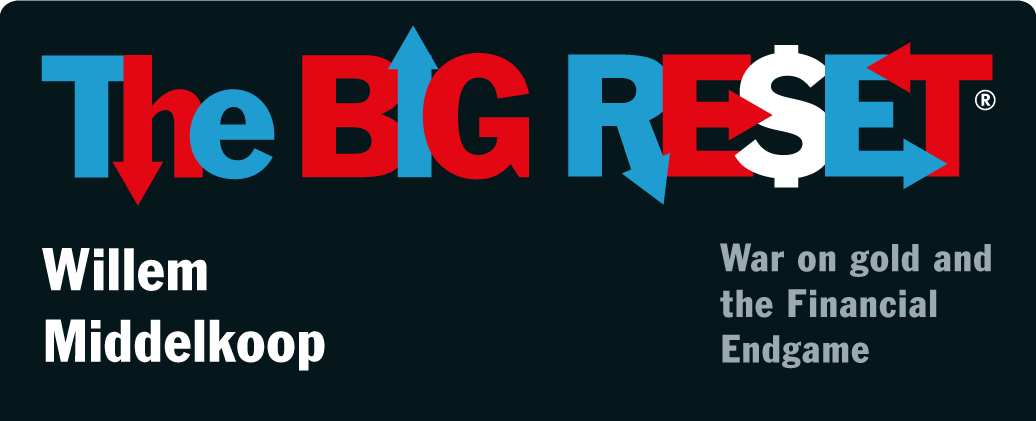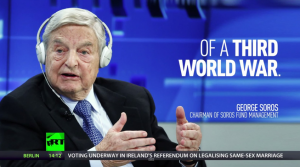Soros: Danger China will align itself with Russia politically and militarily
A previous post learned about the outlook George Soros expressed on the future during the Bretton Woods Committee Annual Meeting 2015 and the role the Bretton Woods institutions could play in this.
This post will highlight some of his statements. The main proposition is that the world is in a situation “where international cooperation is in decline and instead of a global order we have a global disorder. And the same applies to the financial system.” As result “two rival system are emerging”. Are these two systems going to be in a conflict or will they be able to find some common ground and cooperate? How this issue is decided, I think, will have a considerable impact on not only the future of the Bretton Woods institutions but also on the world order.”
Soros starts with a brief historic background of the current situation. “In the cold war there were two major superpowers that had their agents and satellites under control because of the mutually assured destruction in the case of confrontation.” This led to a “mad balance and as a result of which there were skirmishes, but not a world war.”
“After the collapse of the Soviet Union (…) the US had the opportunity to become the sole superpower of the world and guardian of peace.” However, Soros states, the US failed to use that opportunity “because of the lack of understanding of the role of the US in the world. There was no political consensus.” With the end of the cold war, it became clear the Soviets nor the US “historically had a coherent philosophy”. That paved the way for neocons to launch a 1997 project for a New American Century. Out of the twenty-five first signatories to the statement of principles of the movement, ten went to serve in the administration of US President George W. Bush, who was first elected in 2001. George W. Bush’ brother Jeb, who is actually running for a candidacy for the Republican nomination for the 2016 presidential election, was among these first people as well.
The New American Century project “was based on the thesis that since the US had unquestionable military superiority it should use that position for the enhancement of national advantages. That was not a good idea”, according to Soros. “They managed to persuade President Bush to attack Iraq on false pretense and that did not turn out to be good since America lost its military supremacy.”
Despite the lack of political consensus at the time “there was consensus in the financial domain, basically based on doctrines of efficient market hypothesis and the belief that we call market fundamentalism: that was the Washington consensus. This was actually administered by the Bretton Woods institutions, but the system was inherently unstable and the financial crises of 2007 and 2008 led to its collapse.” The circumstances in 2008 were “water shed because it led to the demise of American supremacy by the defeat of President George W. Bush. It also led to the end of Washington consensus.”
“It was the beginning of a process of disintegration process which manifested itself first in the microcosm of the European Union but then also in the world at large. The crash of 2008 had a lasting effect on all the economies of the world with the notable exception of China. China was exception because Chinese banking system was isolated and state owned. China became the mortar of the global economy but a very small one as compared to the consumer demand in US. The recovery was slow because of that but we avoided the things which happened in 1930. The crash of 2008 was also responsible for Euro crisis, which eventually transformed EU from voluntary association of equals which fired the imagination of people like me to something radically different relationship between creditors and debtors where debtors had difficulty meeting their obligations and the creditors sets the rules.”
“This led to an association which was neither voluntary nor equal. The Euro crisis eventually resolved the Euro continuation was assured by Draghi by doing whatever it takes to maintain the Euro which happened with the support of Chancellor Merkel but it left behind political problems so since then the problem of Euro has become the problem of European Union and that was the process of disintegration that started after 2008. The United States also became preoccupied by the domestic problems but by different route because the Republican Party never abandoned the demise of the market fundamentalism and President Obama on his part was preoccupied with domestic issues and I think he made a big mistake because the constitution gives the party and the president more power in the international affairs than the domestic affairs and hence it was subordinated to the congress so he could not achieve very much.”
“Political and military conflicts fasted and multiplied. Maybe the crises were solvable by themselves but they were all interconnected. And the losers in one crisis became the spoilers in other crisis so the crises were not resolved. They started in the Middle East with the Israel-Palestinian conflict from there it spread to the greater Middle East then to Europe and even Africa now. And in Europe you actually have indirectly an indirect war between Russia and the western allies in Ukraine although neither the public nor the leadership fully realizes that. Now I think much depends on how China manages the transition from an export and investment led economy to a domestic led growth and if the transition runs into road blocks then there is a chance, and likelihood in fact, that the leadership would foster some external conflict to keep the country united and remain in power. If there is a conflict between China and an ally of United States like Japan then it will not be an exaggeration to say that we may be on a threshold of a Third World War.” “Of course the United States still has military supremacy but it may be diminishing. The world has broken up in rival camps both financially and politically. The big question is whether they will be able to keep the rivalry within bounds?”
This is a depressing question and here the Bretton Woods institutions could play a major role because they have abandoned their commitment to market fundamentalism. But the controlling shareholders have been reluctant to abandon their control. This was a very short sighted development in the action on their part because it does not account the change in the relative strength of the various economies and particularly the rise of China. China has begun to set up rival institutions: the AIIB and the clearing system. “We might call that a Beijing consensus but it certainly does not necessarily include China’s neighbors which are still looking towards US for support. So you do now have these rival institutions and I think there is an opportunity to build binding connections between the two systems, because the controlling shareholders are not going to abandon their control, no matter how necessary that is. But the SDR are coming up for their five year review and there is a possibility to include the renminbi”, which in Soros’ view would help China in its transition. In the meantime the renminbi is indeed added to the SDR basket. “The United States would be making a major concession by allowing the renminbi to make a step forward in becoming a potential rival of the dollar. So China would have to make similarly major concessions, which would hopefully lead to binding connections between the two camps.
Lastly Soros emphasizes “it is in the interest of both parties to find an accommodation because the alternative is so unpleasant”. A positive note might be that “there has been a major breakthrough in the area of climate policy.” There needs to be a similar breakthrough in the cooperation on economic matters because without it “there is real danger that China will align itself with Russia politically and militarily. And then the threat of a Third World War will become real so it’s worth trying.”
This article was written by Sander Regtuijt


